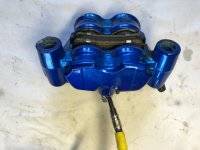Wyled
Well-known member
I'm looking at a pair of calipers, I haven't received yet but they'd be coming in with some blue anodized paint on them. is there a way to remove this that doesn't look terrible and wouldn't affect the inner workings of the calipers like seals and pistons? And I guess is it even worth it to remove the anodizing? What do you guys think? I don't hate necessarily hate the look, but my bike's red not blue. It is Suzuki though.
I attached a picture of what they look like once I get them and one of my bike


I attached a picture of what they look like once I get them and one of my bike



